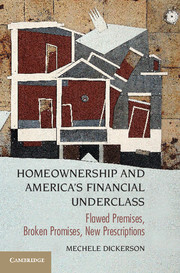 Homeownership and America's Financial Underclass
Homeownership and America's Financial Underclass Book contents
- Frontmatter
- Dedication
- Contents
- Acknowledgments
- 1 Chasing the American Dream
- 2 The Happy Homeownership Narrative
- 3 U.S. Support for Homeowners
- 4 The Homeownership Crisis
- 5 Homeowner Harm and the Blame Game
- 6 Flawed Premises
- 7 The Burden of Home Buying While Black or Latino
- 8 The Benefits of Home Buying While Black or Latino
- 9 Homeownership: Educational Disparities
- 10 Homeownership: Income Disparities
- 11 Outlook and Prescription for the Future
- Index
- References
6 - Flawed Premises
Published online by Cambridge University Press: 05 July 2014
- Frontmatter
- Dedication
- Contents
- Acknowledgments
- 1 Chasing the American Dream
- 2 The Happy Homeownership Narrative
- 3 U.S. Support for Homeowners
- 4 The Homeownership Crisis
- 5 Homeowner Harm and the Blame Game
- 6 Flawed Premises
- 7 The Burden of Home Buying While Black or Latino
- 8 The Benefits of Home Buying While Black or Latino
- 9 Homeownership: Educational Disparities
- 10 Homeownership: Income Disparities
- 11 Outlook and Prescription for the Future
- Index
- References
Summary
In 2003, Franklin Raines, then Chair of Fannie Mae, declared that “[t]he American Dream of homeownership has never been a more powerful lure, nor has it ever been so achievable.” According to Raines,
[i]n almost every respect, 2003 was the greatest year for housing in America’s history. Housing sales were at all-time highs. Mortgage interest rates dropped to their lowest level since the late 1960s. Mortgage originations were up more than 40 percent from just the year before, coming in at a remarkable $3.7 trillion, as consumers bought homes or refinanced their existing mortgage.
Because interest rates were lower than they had been in almost forty years and housing prices had soared, homeowners “felt” wealthy and they refinanced their mortgages to cash out some of this perceived wealth. The year 2003 was definitely a banner year for housing sales and housing financing: corporate profits for the financial services sector and for the real estate industry soared. The year 2003 was not, however, a banner year for the cash-strapped customers who were being lured into buying homes or refinancing their mortgages in order to tap into their housing wealth.
The dramatic disconnect between soaring corporate profits and sinking household finances should have been a warning sign that something was amiss with the Happy Homeownership Narrative. But because U.S. leaders ignored the warning signs, the disconnect between the boardroom and the living room persists to this day. Political leaders still refuse to admit or accept that the Happy Homeownership Narrative is based on flawed premises and assumptions that are no longer valid for many low- and moderate-income (LMI) Americans. Political leaders may refuse to acknowledge the disconnect between the premise and the reality, but those considering buying a home must understand that they are being encouraged to do so not for their own financial well-being but for the good of the U.S. economy and moneyed constituent groups who support U.S. political leaders.
- Type
- Chapter
- Information
- Homeownership and America's Financial UnderclassFlawed Premises, Broken Promises, New Prescriptions, pp. 114 - 144Publisher: Cambridge University PressPrint publication year: 2014


